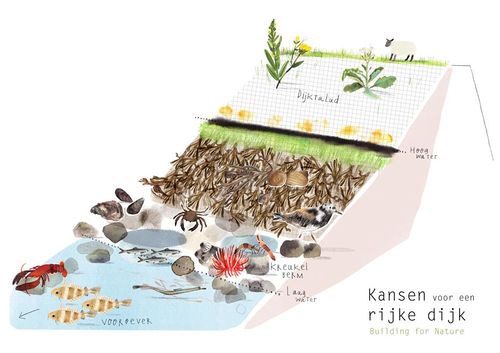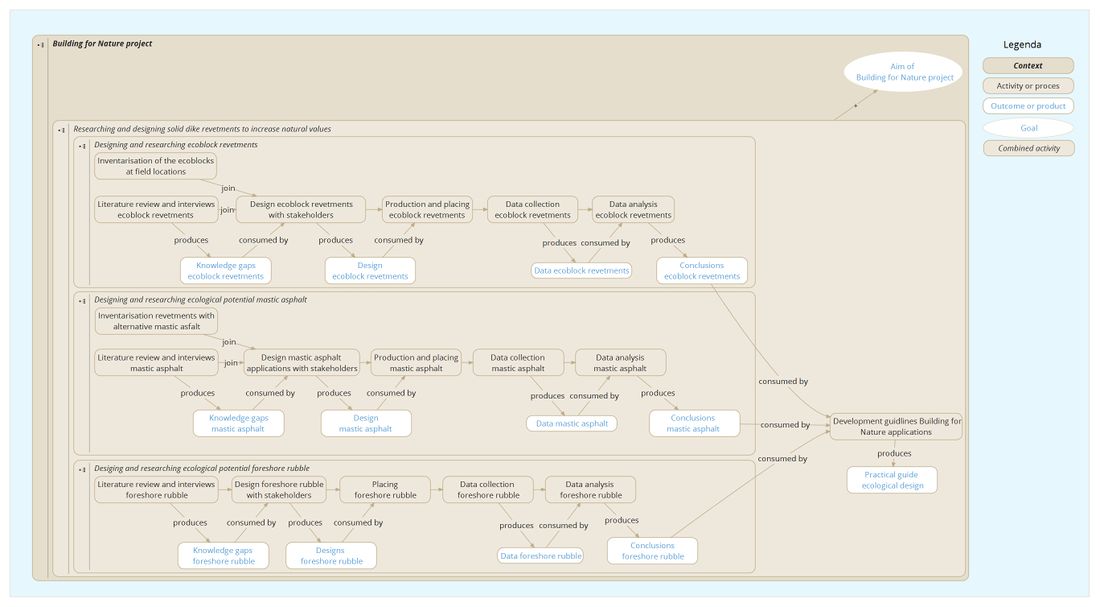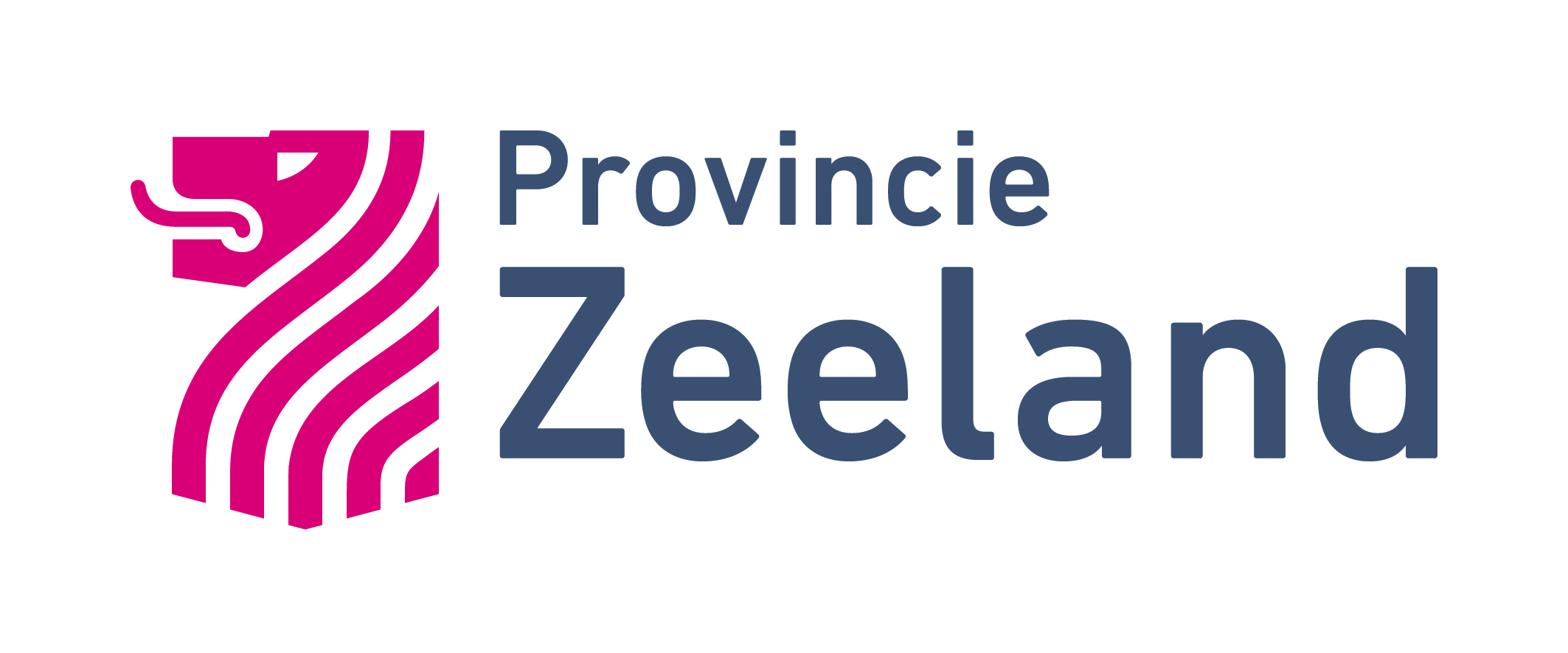| Regel 11: | Regel 11: | ||
|Paragraph number=1 |
|Paragraph number=1 |
||
|Paragraph language=Dutch-English |
|Paragraph language=Dutch-English |
||
| − | |Paragraph=[[Bestand:Illustratie BfN.jpg|thumb|center|500px|Figure 1: Illustration of a 'rich' dike]] |
+ | |Paragraph=[[Bestand:Illustratie BfN.jpg|thumb|center|500px|Figure 1: Illustration of a 'rich' dike.]] |
Building for Nature (BfN) stands for creating an ecosystem by means of applying materials that enhance natural values through their form. The goal of the project ''Building for Nature'' is to investigate materials that stimulate natural values for the construction of dikes and foreshores, while maintaining the hydraulic engineering functions. These materials can at the same time enhance joint use, like diving, fishing and cultivation of oysters and mussels. The Dutch coast, especially the coast in the Southwest Delta, offers a vast potential with several hundred kilometers dikes and enforced foreshores that create a 'rocky coast' with interesting and divers ecological communities, like algae, shellfish and foraging birds. Dike managers don't have sufficient knowledge of materials that maximally exploit this potential. Furthermore, the scientific knowledge is developing rapidly of which materials and which forms will deliver the highest natural values. The RAAK-PRO project is aimed at executing applied research and thereby develop new knowledge and expertise about Building for Nature: new processes of design and construction for dikes and foreshores, which create added value for nature and joint use, besides safety. You can find more information in the (Dutch) {{Cite|resource=File:RAAK PRO projectvoorstel BfN innovatie van dijken en vooroevers RAAK PRO HZ 05nov2012.pdf|name=project plan ''Building for Nature: innovatie van dijken en vooroevers''}}. |
Building for Nature (BfN) stands for creating an ecosystem by means of applying materials that enhance natural values through their form. The goal of the project ''Building for Nature'' is to investigate materials that stimulate natural values for the construction of dikes and foreshores, while maintaining the hydraulic engineering functions. These materials can at the same time enhance joint use, like diving, fishing and cultivation of oysters and mussels. The Dutch coast, especially the coast in the Southwest Delta, offers a vast potential with several hundred kilometers dikes and enforced foreshores that create a 'rocky coast' with interesting and divers ecological communities, like algae, shellfish and foraging birds. Dike managers don't have sufficient knowledge of materials that maximally exploit this potential. Furthermore, the scientific knowledge is developing rapidly of which materials and which forms will deliver the highest natural values. The RAAK-PRO project is aimed at executing applied research and thereby develop new knowledge and expertise about Building for Nature: new processes of design and construction for dikes and foreshores, which create added value for nature and joint use, besides safety. You can find more information in the (Dutch) {{Cite|resource=File:RAAK PRO projectvoorstel BfN innovatie van dijken en vooroevers RAAK PRO HZ 05nov2012.pdf|name=project plan ''Building for Nature: innovatie van dijken en vooroevers''}}. |
||
Versie van 12 jan 2016 om 11:05
| Bfn Building for Nature project | |
|---|---|
| Beschrijving | |
| Overkoepelende context | |
| Context type | Situation |
Building for Nature (BfN) stands for creating an ecosystem by means of applying materials that enhance natural values through their form. The goal of the project Building for Nature is to investigate materials that stimulate natural values for the construction of dikes and foreshores, while maintaining the hydraulic engineering functions. These materials can at the same time enhance joint use, like diving, fishing and cultivation of oysters and mussels. The Dutch coast, especially the coast in the Southwest Delta, offers a vast potential with several hundred kilometers dikes and enforced foreshores that create a 'rocky coast' with interesting and divers ecological communities, like algae, shellfish and foraging birds. Dike managers don't have sufficient knowledge of materials that maximally exploit this potential. Furthermore, the scientific knowledge is developing rapidly of which materials and which forms will deliver the highest natural values. The RAAK-PRO project is aimed at executing applied research and thereby develop new knowledge and expertise about Building for Nature: new processes of design and construction for dikes and foreshores, which create added value for nature and joint use, besides safety. You can find more information in the (Dutch) project plan Building for Nature: innovatie van dijken en vooroevers.
A summary of the project and its organisation can be seen on this page (in Dutch)
Literature
References to relevant literature are made in the text on the pages.
An overview of reports and articles of the project can be seen at this page.
Further reading
Underneath you'll find a so called 'concept map' of the Building for Nature project. This concept map follows the consecutive steps in the execution of the project. The nodes in the concept have been made clickable, in order to access the information behind each node. The researchers will fill the pages with information during the term of the project.
De View-Navigation (VN) pagina's.
De opbouw van deze context.
- Subcontexten
| Bfn Experiments with Elastocoast at Zuidbout and Petten |
| Bfn Natural temperate rocky shores |
| Bfn Natural values of solid dikes |
| RAAK-PRO-project Building for Nature (BfN) |
- Actor
- Practices & Experiences
| Type | |
|---|---|
| Bfn Building for Nature project experience | Experience |
- Elementen
- Links tussen elementen









